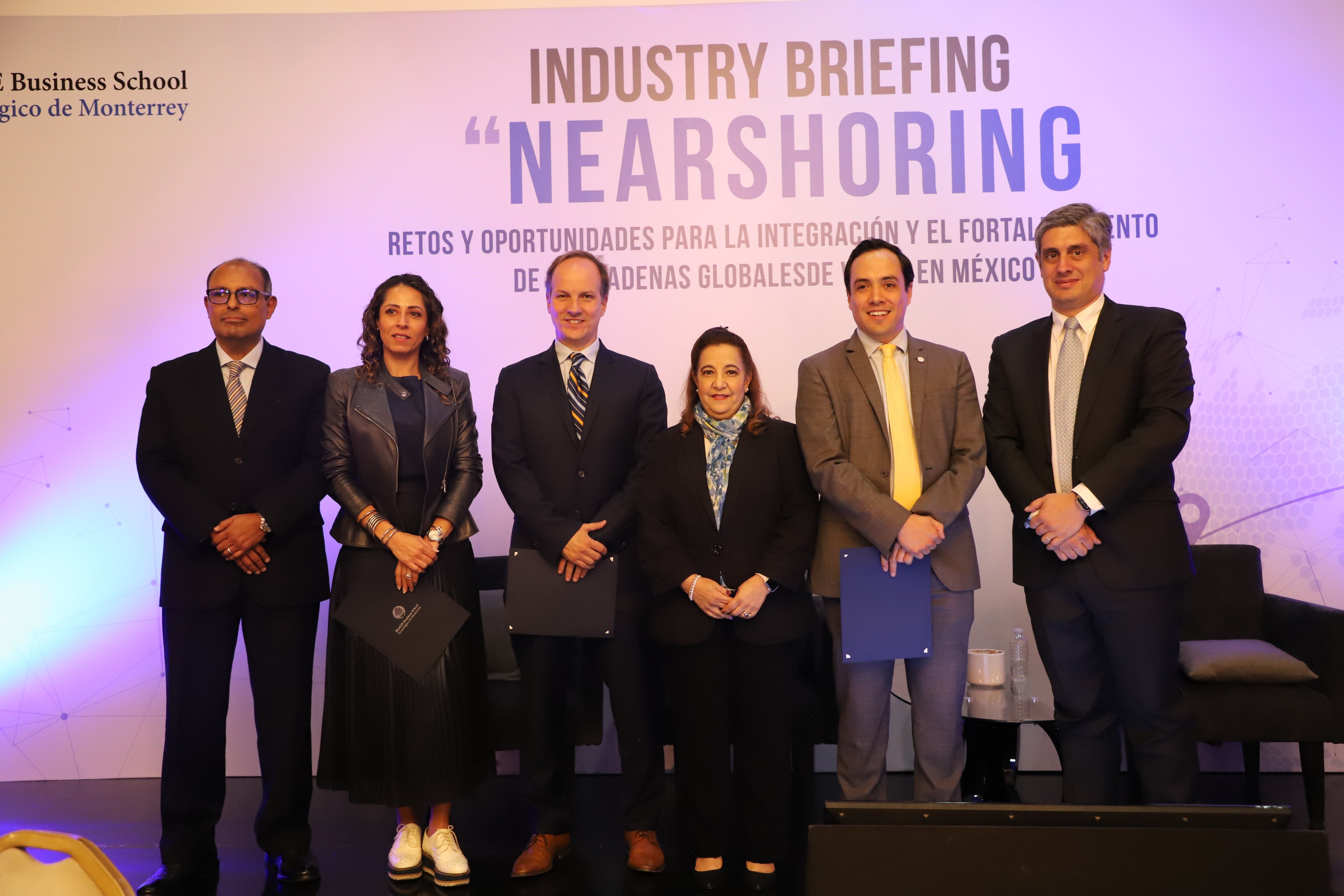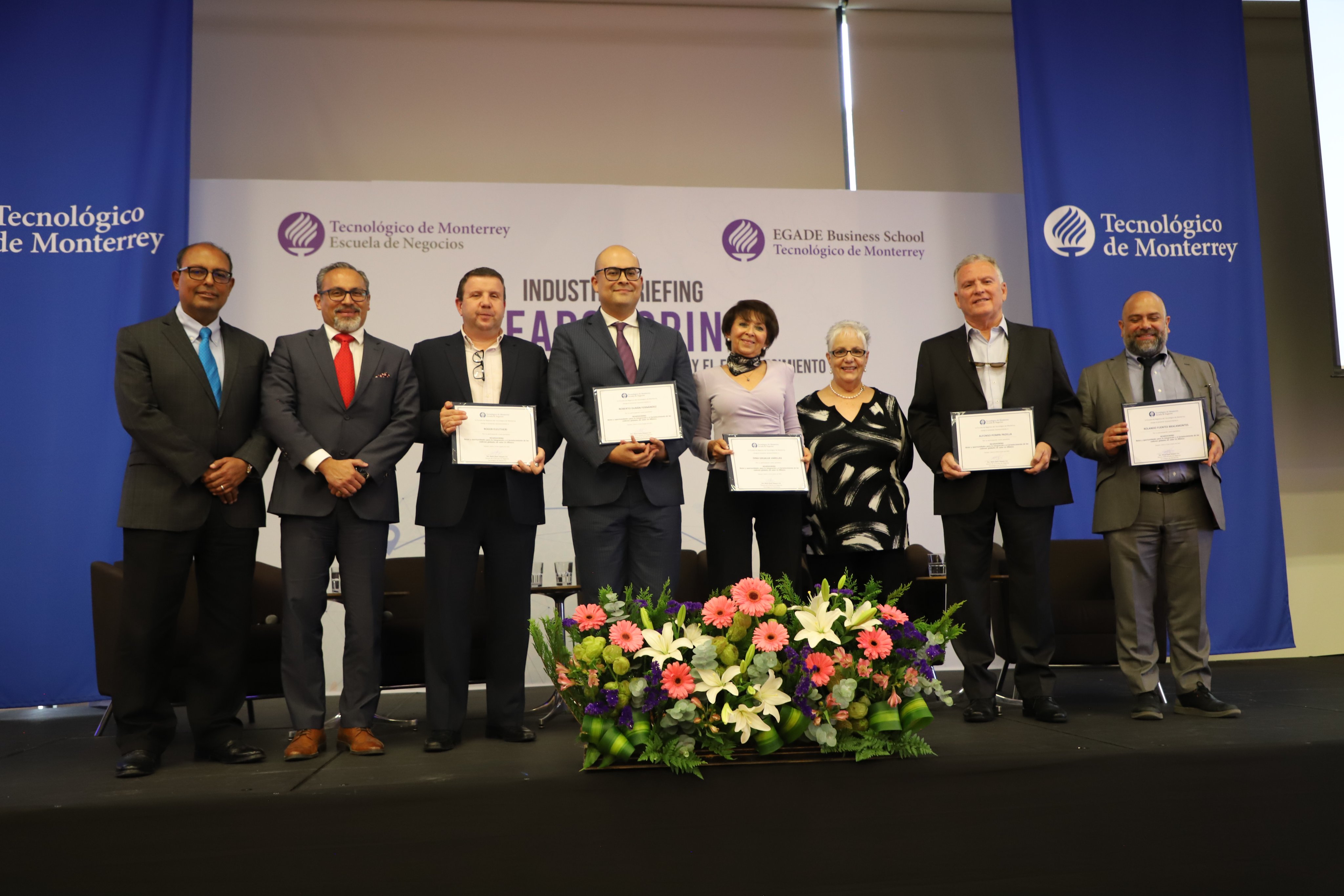With events held at Hacienda de los Morales (Mexico City) and the Guadalajara campus, in addition to the previously conducted event in Monterrey, the faculty of the Business School at Tecnológico de Monterrey continues to disseminate the results of the report 'Nearshoring: Challenges and Opportunities for the Integration and Strengthening of Global Value Chains in Mexico' among experts, decision-makers, entrepreneurs, and the general public interested in understanding trends in supply chain relocation and leveraging this phenomenon for business development and the country's growth.
During these multi-campus presentations in the country's major cities, academic leaders such as María Elena Vázquez Lira, National Dean of the Business School, Osmar Zavaleta, Associate Dean of Research for the Business School and EGADE Business School, and Horacio Arredondo, Dean of EGADE Business School, as well as co-author researchers of the study and guest panelists from other Tec schools, government, businesses, and industry associations, have been able to expand and strengthen connections with allies and put into service the achievements produced in the School's research group ecosystem.
"This opportunity (of nearshoring) comes exogenously and not as a result of a capacity-building strategy. We must address challenges and strengthen our institutional capabilities, strategically invest in infrastructure, and enhance our human capital to make the most of this opportunity," expressed Dean María Elena Vázquez during the presentation in Guadalajara.

Presentation in Mexico City
On October 12th, during the report presentation in Mexico City, Horacio Arredondo, Dean of EGADE Business School, emphasized that the success of nearshoring depends on comprehensive collaboration among all social and economic actors.
"From academia, the public sector, the private sector, and civil society, we must ensure that we harness and sustain the benefits of these investments for Mexican businesses and society at large," he said.
The dean highlighted advancements in public policy, noting the recent decree issued by the Federal Government to boost nearshoring investments in Mexico. This decree includes fiscal incentives for companies seeking to relocate in various parts of the country and in ten key sectors of the Mexican economy.
In a scenario where companies often operate with geographically distributed teams, Arredondo stressed the importance of developing leaders capable of effectively leading global teams, understanding the cultural and geographical dynamics that influence decision-making.
"At EGADE Business School, we are committed to preparing transformative leaders capable of challenging their companies to be more innovative, ethical, and sustainable," he affirmed.
Arredondo cautioned about the need to ensure the sustainability of this development model and advocated for the creation of quality jobs and fair wages that benefit the entire society and not just a select group.
Osmar Zavaleta, Associate Dean of Research for the Business School and EGADE Business School, highlighted the forward-looking preparation of the report, analyzing Foreign Direct Investment (FDI) and the nearshoring phenomenon from various perspectives: geopolitics, economy, logistics, human capital, energy, among others.
In the context of FDI, Zavaleta observed that it's estimated that Mexico will attract $36.7 billion in 2023 and $37.67 billion in 2024, according to the analysis of the Center for Public Finance Studies. However, as of the first semester of 2023, the country has attracted $29.04 billion, according to the Ministry of Economy.
The academic pointed out that the industries that attract the most FDI to Mexico include metallurgy, machinery, medical devices, household goods, computing, and automotive.
The presentation in Mexico City included a panel with the participation of Emilio Cadena, CEO of Grupo Prodensa; Fernanda Guarro, President and CEO of 3M; and Miguel Ángel Santos, Dean of the School of Government and Public Transformation at Tecnológico de Monterrey, moderated by Mercedes Poiré, Director of EGADE Business School, Mexico City campus.
These business and academic leaders emphasized the importance of developing innovative strategies in nearshoring.
Invited to conclude the event, Alejandro Encinas Nájera, Undersecretary of Foreign Trade at the Ministry of Economy (SE), highlighted that Mexico is facing a historic opportunity for economic growth with social justice.
He also emphasized that in the context of nearshoring, Mexico stands out for its young and working population, with an average age of 29, and is about to reach its demographic bonus, with an increasingly educated and specialized population.
"The convergence of the nearshoring phenomenon with the demographic bonus is the window of opportunity that will be among us in the coming years, and we must take full advantage of it to bring prosperity, dignified work, knowledge, technology, and well-being to Mexicans," the federal official elaborated.

Presentation for Jalisco
During the report presentation in Guadalajara on October 18th, María Elena Vázquez Lira, National Dean of the School, highlighted the relevance of Mexico as a focus for international investment in various industries:
"This phenomenon represents an exciting opportunity for our country. It challenges us to leverage our unique advantages and overcome obstacles with courage," she specified, adding four reasons for these advantages:
Geographical and cultural proximity. "We share a 3,152 km border with the United States and a history of over 30 years as trading partners. This gives us a significant advantage in terms of proximity and cultural understanding."
Competitive labor costs. "We have a skilled workforce at lower costs compared to developed countries. This makes Mexico an attractive option for companies seeking operational efficiency."
Talent and education. "Mexico has a young and increasingly educated population. This provides companies with access to diverse and highly skilled talent."
Strong trade agreements. "Our country has a robust trade framework with the United States and Canada, facilitating cross-border trade and investment."
Additionally, during his turn, Osmar Zavaleta emphasized the role of Jalisco and the opportunities this phenomenon presents for the state. He noted that efforts are being directed to attract investments from 19 Chinese companies in the electromobility, fiber optics, and high-tech sectors, promising further diversification of the investment landscape at the state level.
As the leader of the Research Group on Organizational Strategy and Industry Transformation at the Business School, he mentioned that it is estimated that Jalisco will attract a total FDI of around $3 billion by the end of 2023. This reflects sustained growth and increased interest from both national and foreign investors in the region.
Zavaleta also highlighted that Jalisco ranks fourth among the 11 states receiving the most FDI in Mexico, accounting for 5.9% of the total accumulated from 1999 to 2022, according to their own estimates based on data from the National Registry of FDI of the federal Ministry of Economy.
The panel during the presentation included the participation of Rolando Fuentes, a research professor at EGADE Business School; Roberto Durán, a research professor at the School of Government and Public Transformation; Dina Grijalva, Supply Chain Executive at IBM Mexico and VP of Government Relations and Business Linkage for CANIETI Occidente; Roger Eleutheri, Director of Bosch and President of CANIETI. The meeting was moderated by Raúl Montalvo, Director of EGADE Business School, Guadalajara campus.
The experts reflected on the challenges and opportunities of Jalisco and the country regarding nearshoring, emphasizing the importance of supporting talent development, local supply chains, investment, and infrastructure, improving public policies, and strengthening the triple-helix collaboration.
"There are certain technologies that we need to start considering, as part of public policy and business decisions, such as distributed generation (of electrical energy)," warned Fuentes.
Grijalva pointed out, "We need to work together, in the triple helix, to have the development of specialized talent that we will need to attract these investments; they should come with design, with emerging technologies."
As the guest to conclude the event, Alfonso Pompa, Secretary of Innovation, Science, and Technology of Jalisco, expressed that "historically, nearshoring has been driven by the interests of the United States." Therefore, he said, efforts must be made for Mexico to position itself as a more relevant player globally, similar to China, South Korea, and India.